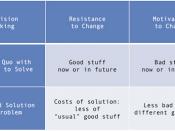When an innovation or change like diversity and ethical decision-making is introduced into an organization, managers and employees don't all immediately want to adopt it. Instead, many typically greet this change with enthusiasm by some, skepticism and even hostility be a few. While valuing diversity is good for people, it is business itself that stands to reap the greatest benefit from adopting this change. Whether management is aware of the costs or not, every organization play a heavy price in reduced productivity, lost sales, limited innovation, higher absenteeism, and higher turnover with diversity and ethics are not valued. Like any new idea or decision, ethics moves through an organization, gaining momentum and support in a predictable pattern. In the early stages of introduction, ethics will be adopted by a small group of idealistic, committed people. Later on after the trial and error stage is over and there are successful results to point to among the early adopters, the majority of people will begin to buy in.
Eventually, if implementation is successful, ethical decision-making will become part of the mainstream culture with just a few laggards left to continue resisting it.
I think the ground rules of ethical decision -making are the following:1.Compatibility - How similar is ethics to present attitudes, beliefs, and practices within the organization.
2.Simplicity - How simple is it to understand decisions based upon ethics.
3.Testability - Can the idea be tested in a small segment of the organization first? Can successes be easily replicated in other departments or work groups?4.Observability - When are ethics valued, can people in the company easily see the results.
5.Relative Advantage - How great an improvement will decisions valuing ethics make in our organization when compared to the traditional practices it is expected to replace.
Valuing ethics and diversity is a deep and fundamental change. Although simple to understand, it is not easy to put into practice. Whit it offers important long-terms benefits to individuals and organizations, these benefits are not always tangible or easily seen. To speed adoption, the issues surrounding compatibility, complexity, and observability must all be addressed.
I think the ground rules of ethics in decision-making should be:1.Level of perceived risk - The extent to which a segment perceives valuing diversity as a potential threat.
2.Primary motivation - The principal reasons why a segment would be interested in making decisions regarding ethics.
3.Key segment messages - Major themes to emphasize in communications to a particular segment.
4.Timing of segment involvement - the appropriate time for involving a particular segment in the implementation process.
I think that the ground rules of ethics in decision-making could be:1.Support of the long -term goal of culture change.
2.Position valuing diversity as a business strategy.
3.Emphasize inclusion, mutual respect, and cooperation.
4.Encourage innovation and empowerment.
I think that my manager being hired was a decision based upon ethics. Although she has been with the company nine years, holds two Masters and two Bachelors Degrees, and knows her job above and beyond. She's had those same qualifications when she first came to the company, and was never promoted until the merger. My organization merged with another company that felt there were not enough female minorities in management; which resulted in her immediate promotion. In my opinion the ethical implications of this decision were that it sought out fresh ideas from a different perspective, and made a sacrifice to meet the larger organizational goal.
I think that when my manager was promoted it slightly changed the grounds rules because it dramatically changed the atmosphere. We were not prepared for her new ideas, approaches, and new information. Mostly every individual within my department is happy that my manager was promoted but due to her personality she's not well suited for the position. If this ethical decision had been made with any other individual besides her, I think teamwork and respect would have been enhanced. I also believe that before a promotion is granted due to ethics, you should consider the position, leadership behavior, and personality of the individual.
Regardless of what core identities we each have, we all want to be happy, respected, and loved. In the workplace, we all want to be recognized for who we are and appreciated for what we do. We want to feel comfortable with those with whom we work. We want to believe that our ideals and opinions are valued and that they influence important decisions that affect our work and us. These are basic desires that we all share, the common ground we stand on regardless of the differences in primary and secondary dimensions of diversity and ethics that separate us.
ReferencesBrowne, M.N. & Keeley, S. M (2000) Critical Thinking Asking the Right Questions, Boston: Pearson Custom PublishingMcCall, M.W. & Kaplan, R.E. (1990) Whatever It Takes The Realities of Managerial Decision Making, Upper Saddle River: Prentice-Hall, Inc.
James H. Brewer & J. Michael Ainsworth & George E. Wynne (1984)Power Management a Three-Step Program For Successful Leadership, Prentice-Hall, Inc., Englewood Cliffs, New Jersey.


